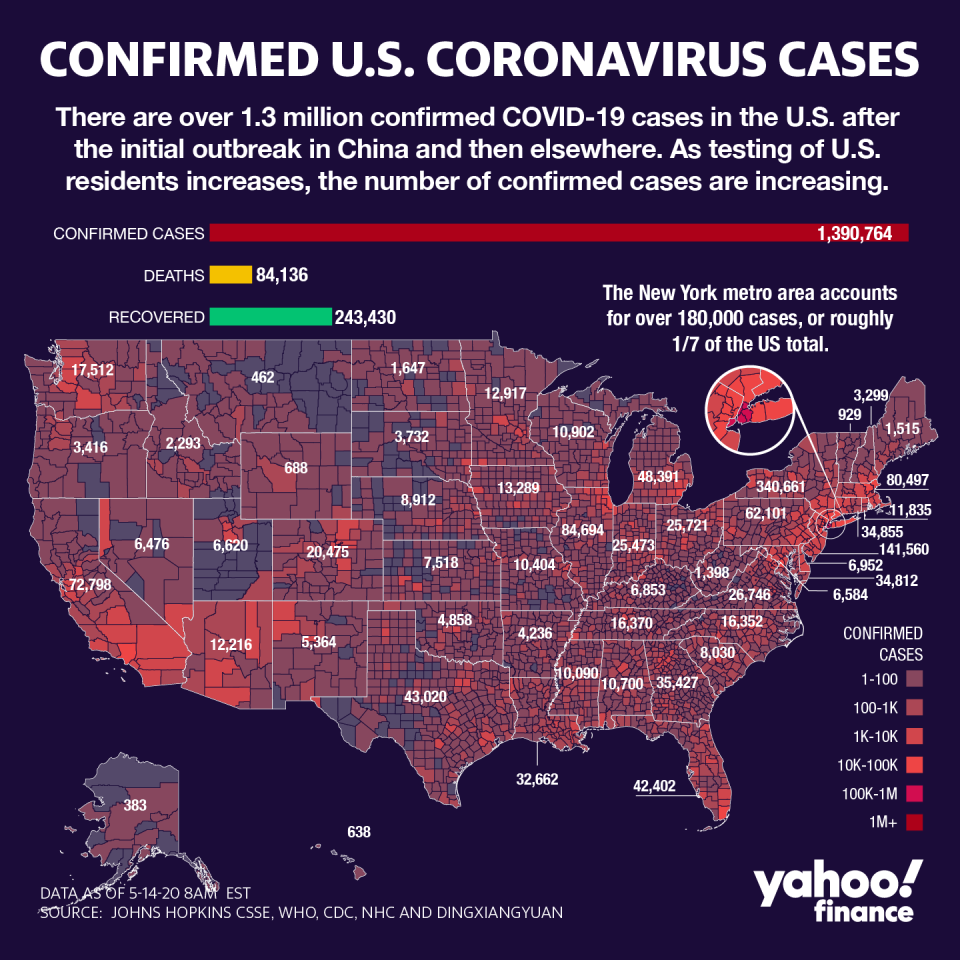Coronavirus update: Soaring jobless claims jolt US debate over reopening states
America’s growing ranks of jobless workers underscored the severe toll the coronavirus pandemic has taken on the world’s largest economy, while heightening a polarizing debate over restarting the U.S. economy.
On Thursday, the Labor Department showed that nearly 3 million people filed unemployment claims — hitting a staggering new milestone of over 36 million individuals pushed out of work since the COVID-19 crisis forced the shutdown of public life and whipsawing markets in early trading.
Gene Sperling, the former director of the National Economic Council under both Presidents Clinton and Obama, told Yahoo Finance in an interview that the crisis has hit the working class the hardest, given that many are unable to work remotely.
“And so when their businesses are closed, they, you know, they lose their job outright. So in a sense, lower income Americans are really taking a deep hit, both in losing jobs, both in suffering more of the lack of safety when they are working,” he said on Wednesday.
Economists are now debating how many of those jobs will be regained once states reopen, and how quickly the U.S. economy recovers. However, the virus that has infected more than 4.3 million worldwide and killed nearly 300,000 shows no signs of ending its deadly march across the globe.
In the U.S., nearly 1.4 million have been infected and more than 84,000 have died, yet states are actively planning how and when to reopen businesses and public institutions — some with stricter guidelines than others. That has prompted widening concerns that some might be moving too quickly, which may hasten a resurgence of illnesses, even as signs point to a potential leveling off in U.S. diagnoses and deaths.
In a post on Twitter, Ex-CMS administrator Andy Slavitt said that a new wave was “inevitable and public officials in the U.S. must be prepared to quickly adjust.”
The debate took a new twist on Wednesday, after Wisconsin’s state’s Supreme Court overruled Governor Tony Evers’ stay-at-home orders, a decision that the governor publicly blasted.
Health experts are concerned about what is happening in Germany — which saw a tripling of cases, as well as parts of the U.S. which are seeing a rise in cases. Europe’s largest economy began lifting restrictions late last month, but some regions are bringing back stricter measures to combat a spike in COVID infections.
In a U.S. House of Representatives subcommittee briefing Wednesday, former FDA commissioner Scott Gottlieb said the country is opening back up against the backdrop of an ongoing epidemic, and actions taken should take into consideration that new cases are still going to happen.
Big Pharma gears up response

Amid plans by states to loosen restrictions and prepare businesses to have employees return to work, there are also concurrent discussions about how to screen employees and customers for potential infections.
Some of the country’s largest tech companies, like Microsoft (MSFT) and Google (GOOG), have delayed a return for their workers until late fall, or the end of 2020.
For those planning to open sooner, however, LabCorp (LH) announced Thursday it was rolling out an employer package for businesses looking to reopen, which includes a questionnaire for employees, temperature checks and a finger prick antibody test.
“Many U.S. companies have asked for LabCorp’s assistance as they implement their return to work strategies for the summer and fall,” the company said.
But in a well-timed note, the American Medical Association released guidance for health officials Thursday about the usefulness of antibody tests. While they help with surveillance of the outbreak, they do not provide any useful insight yet.
The AMA “warns against determining immunity or discontinuing physical distancing based on antibody testing,” according to the statement Thursday.
Meanwhile, CVS (CVS) is ramping up its offering of drive-up nasal swab testing — a solution to the strain on personal protective gear at drive-thru testing sites. It allows self-swabbing under supervision of clinical professionals, which are mailed to a lab, to confirm cases of the coronavirus.
The company said it hopes to be able to process 1.5 million test per month, “subject to availability of supplies and lab capacity,” from over 1,000 sites by the end of May,” according to the company’s statement. CVS currently operates testing sites in five states.
Testing is just one of the key tools public health experts say are needed to continue to address the outbreak until a vaccine is found.
That race continues, with leading pharmaceutical companies ramping up production, at-risk. In an interview with Bloomberg this week, Sanofi’s (SNY) CEO, said the U.S. would get preferential treatment, since an arm of the National Institute of Health helped fund the research of the vaccine candidate.
But the French company has since walked back that statement after significant backlash from the French government. The incident highlights the sensitive geopolitical considerations surrounding potential treatment breakthroughs, and where successful vaccines will be distributed as companies face an unprecedented demand.
Anjalee Khemlani is a reporter at Yahoo Finance. Follow her on Twitter: @AnjKhem
[Click here for more of Yahoo Finance’s coronavirus coverage: Personal finance tips, news, policy, graphics & more from Yahoo Finance]
Follow Yahoo Finance on Twitter, Facebook, Instagram, Flipboard, LinkedIn, and reddit.
Find live stock market quotes and the latest business and finance news.
